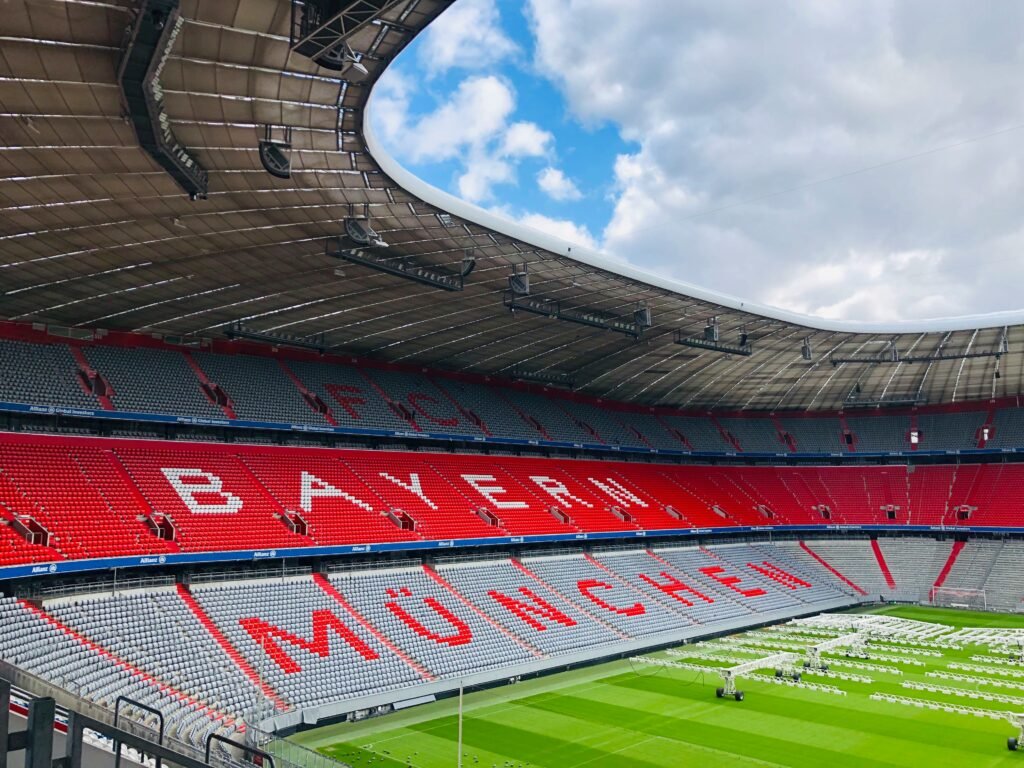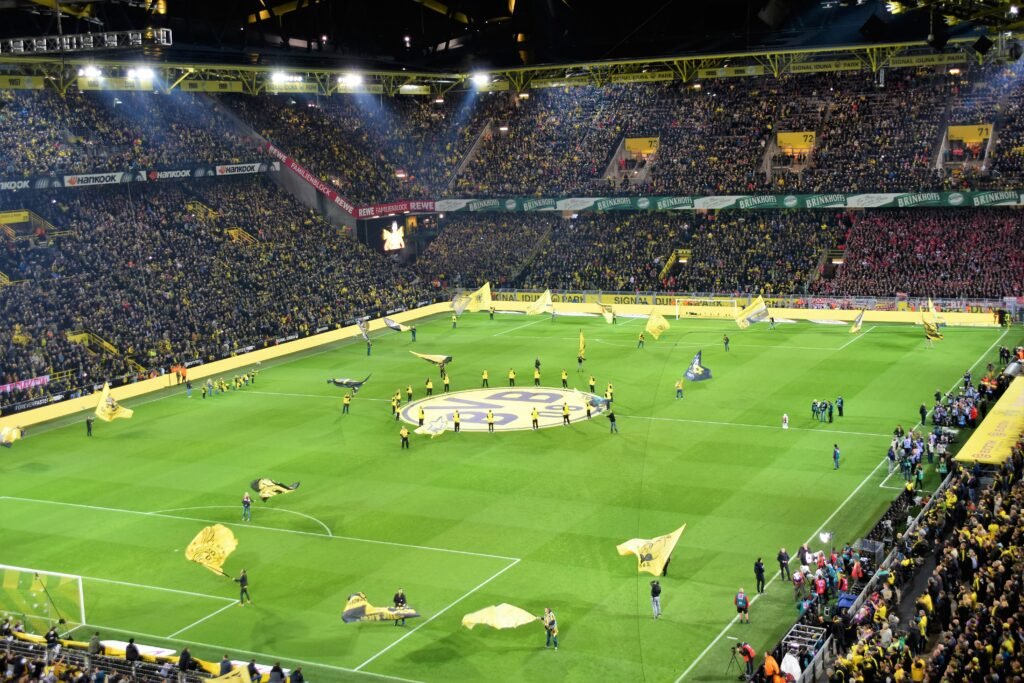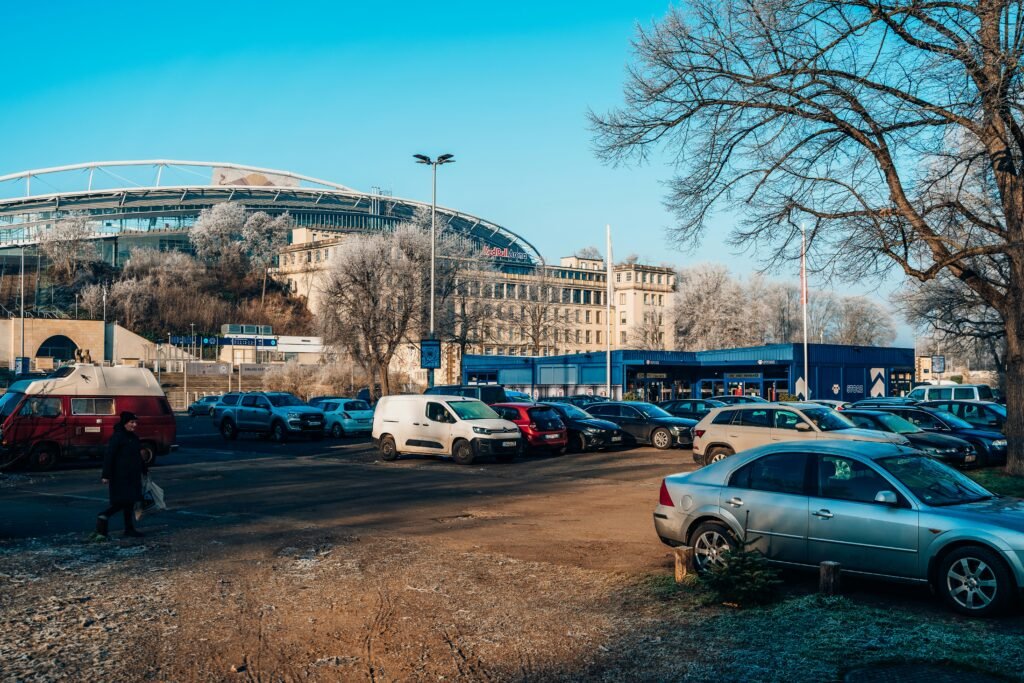Germany is known for its legendary stadiums, which are the center of the nation’s intense fan culture and rich football history. Let’s explore the exciting world of German football stadiums, where the country’s passion for the beautiful game is reflected in every cheer, chant, and celebration.
Munich’s Allianz Arena:
One example of brilliant modern architecture is the Allianz Arena. This magnificent stadium, which is host to FC Bayern Munich & TSV 1860 Munich, features illuminating panels on its outside that can be adjusted to reflect different hues, representing the colors of the home team during games.

It is one of the most recognizable stadiums in the world, not only in Germany, thanks to its futuristic architecture and cutting edge amenities.
Signal Iduna Park (Dortmund):
Commonly referred to as the “Yellow Wall,” is the stronghold of Borussia Dortmund. It is the biggest football stadium in Germany, holding more than 81,000 spectators. It is known for its thrilling atmosphere, which is especially evident during the renowned “Der Klassiker” matches vs Bayern Munich.

For every football fan, seeing over 25,000 people dressed in yellow, fervently supporting their side, is something to behold.
Veltins-Arena (Gelsenkirchen):
The stadium that serves as home to FC Schalke 04 is well-known for having a retractable roof that makes it possible to play football there in any kind of weather. On game days, the passionate fan base and state-of-the-art design generate an exciting environment.Memorable international matches, including ones from the 2006 FIFA World Cup, have also taken place in the stadium.
Olympiastadion (Berlin):
With a rich history, the Olympiastadion is a cultural icon as well as a football stadium. Built to host the 1936 Summer Olympic Games, the stadium has undergone renovations and modernizations and is now home to Hertha BSC. The stadium is a famous location for domestic as well as international football games because of its impressive architecture and capacity for approximately 74,000 people.
The RheinEnergieStadion in Cologne:
It provides a distinctive footballing experience. It is tucked away in beautiful surroundings. This stadium, which is host to 1. FC Köln is charming and unique. Because of its small size, supporters can interact directly with players, which strengthens their sense of unity.
Mercedes-Benz Arena in Stuttgart:
Originally called the Gottlieb-Daimler-Stadion, This arena serves as the home field for VfB Stuttgart. Thanks to its unique roof design and superb acoustics, it offers football fans an amazing space. The stadium’s appeal is increased by its close location to the Mercedes-Benz Museum, which provides guests with a window into the past of both motoring and sports.
Leverkusen’s BayArena:
The BayArena, home of Bayer 04 Leverkusen, is well known for its eye-catching architecture and lively atmosphere. It might not be the biggest stadium in Germany, yet it sure as hell delivers a lot of excitement with more than 30,000 seats. The stadium’s near closeness to the field of play guarantees that spectators have a close-up view of the action, resulting in an exciting atmosphere on match days.
Red Bull Arena (Leipzig):
The Red Bull Arena is the pinnacle of contemporary football stadiums and is home to RB Leipzig. It provides viewers with a comfortable and engaging experience with its svelte design and first-rate facilities.

The stadium is a multipurpose hub of entertainment, hosting everything from concerts to international matches and Bundesliga matches thanks to its adjustable seating design.
The Commerzbank-Arena in Frankfurt:
formerly the Waldstadion, is a historic and traditional venue. This stadium, which is host to Eintracht Frankfurt, has been the scene of many noteworthy German football moments. It is a popular location for both players and spectators due to its distinctive roof design and lively environment. The stadium’s central Frankfurt location only serves to enhance its allure, drawing fans from all around the city.
WWK ARENA (Augsburg):
The WWK ARENA is charming and intimate, even for its relatively small size. This stadium, which is host to FC Augsburg, may not be as opulent as some of its peers, but its enthusiastic fan base and vibrant atmosphere more than make up for it. The stands’ closeness to the field guarantees that spectators never have to be far from what’s going on, making every visitor’s experience thrilling and unforgettable.
FAQs:
1. What are a few of Germany’s most well-known football stadiums?
The Olympiastadion in Berlin, the Veltins-Arena in Gelsenkirchen, the Allianz Arena in Munich, and Signal Iduna Park in Dortmund are a few of the most well-known football stadiums in Germany.
2. Which German stadium is the biggest?
With more than 81,000 seats, Signal Iduna Park, the home of Borussia Dortmund, is the biggest football stadium in Germany.
3. What distinguishes the ambiance of German football stadiums?
German football stadium atmospheres are well known for their fervor, intensity, and boisterous fan support. The colorful decorations at the Allianz Arena and the “Yellow Wall” at Signal Iduna Park are only two instances of the lively ambiance found in German stadiums.
4. Can tourists be given tours of German football stadiums?
Indeed, a lot of German football stadiums have guided tours so that guests may go behind the scenes, discover the history of the venue, and take in the atmosphere directly. Visits to the player tunnels, locker rooms, and other restricted areas are frequently included in tours.
5. How can I buy football tickets for games at stadiums in Germany?
German football stadium tickets are normally available for purchase via the official web pages of the participating teams or through accredited ticket resellers. Tickets sell out quickly, so it’s best to reserve them well in the future, particularly when it comes to well-known matchups.
To read more, click here
